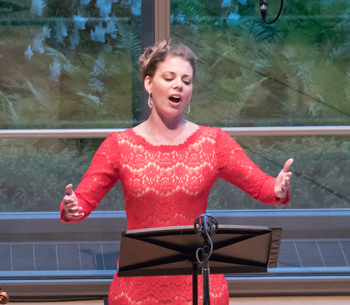by Nicholas Jones

The man that hath no music in himself,
Nor is not moved with concord of sweet sounds,
Is fit for treasons, stratagems, and spoils;
The motions of his spirit are dull as night,
And his affections dark as Erebus.
Let no such man be trusted. Mark the music.
Essentially, don’t trust anyone who doesn’t love music. In the context of Shakespeare’s play, the music that he commends isn’t just music: it stands for something else, like so much else in Shakespeare. More broadly, he’s advocating a worldview that sees the universe as harmonious — interconnected and superbly organized — and urges us to match our human activity to the perfection of that “music of the spheres.”
In the tenth of twelve concerts in its 2016 season, ChamberFest Cleveland gave a musical glimpse of that Shakespearean worldview. This was a delightful program of four very different pieces, loosely connected by their relationship with Shakespeare. Two of the offerings were familiar to most concertgoers; two were new, at least to me. With the brilliant musicianship of ChamberFest’s remarkable company, all four came across as fresh and memorable.
The first piece was Erich Korngold’s Four Shakespeare Songs (Op. 31), performed by mezzo-soprano Marjorie Maltais and pianist Roman Rabinovich. Written in the late 1930s, during the difficult period when the composer had fled Europe for America, these remarkably pastoral songs are tunefully modernist in style, their character alternating nicely between melancholy and sprightliness. Maltais sang with clear diction, centered tone, and lots of dramatic expression. Incorrect texts printed in the program caused some confusion in the audience.
Shakespeare was a crucial inspiration for Beethoven. One can hardly imagine a more Shakespearean view of power than the “Eroica” Symphony, at first dedicated to the meteoric hero Napoleon, a dedication that Beethoven scratched out in anger when Napoleon crowned himself Emperor. A different Shakespearean allusion lies behind Beethoven’s first string quartet (Op. 18, No. 1), the second piece on the program. As he told a friend, the lyrical second movement was inspired by the tomb scene at the end of Romeo and Juliet.
ChamberFest’s performance of the quartet could be called Shakespearean in another way — full of the variety of his passion and dramatic inventiveness. Violinists Yura Lee and Diana Cohen, violist Dimitri Murrath, and cellist Julie Albers performed the quartet with a collective clarity of gesture and interpretation unusual in a group that comes together only during a festival. Part of the ensemble’s cohesive balance came from the utter ease and mastery with which Yura Lee — truly an exceptional player — handled the virtuosic first violin part.
The third piece had no Shakespearean link that I could perceive, but seemed to need none to fit in the evening’s trajectory. Night Time, by American composer Sebastian Currier, is a set of five nocturnes for violin and harp, here performed by Itamar Zorman and Sivan Magen. The music revels in the differences of texture between the two instruments, pushing each — especially the harp — to virtuosic limits while never losing its sense of atmosphere and character. The overall effect was wordlessly poetic, painting the night with delicate evocations of insects at dusk, evening prayers and midnight anxieties, and ending with a lovely, almost pointillistic starlight.
The program concluded with six movements drawn from Sergei Prokofiev’s Romeo and Juliet Suites (Op. 64). This new version, for string quintet, clarinet, trumpet, horn, percussion, and piano, was arranged for the festival by Roman Rabinovich. The individuality that chamber music demands of each player gave the Prokofiev a leaner and more flexible embodiment than it gets in the orchestral version.
If the ensemble in the Prokofiev was a shade less precise than in the earlier pieces, the zest of the performers more than made up for it. Boisterous and brash when they needed to be, soulful at other times, this big group of excellent players was obviously having fun playing this familiar music in such a new way.
Diana Cohen led the group as first violin, facing her father, clarinetist Franklin Cohen; other players included violinist Alexi Kenney, violist Dimitri Murrath, cellist Timotheos Petrin, and bassist Nathan Farrington — all of whom had multiple solo moments. Trumpeter Brandon Ridenour and hornist Benjamin Jaber provided the crucial brassy coloration characteristic of Prokofiev, while percussionist Alexander Cohen (playing a battery of nearly a dozen instruments) and pianist Roman Rabinovich kept the rhythmic energy flowing.
After much musical passion, the final selection — “Romeo and Juliet Before Parting” — tapered off to a delicate and almost magical ending, capturing the tenderer side of Shakespeare’s tragedy of star-crossed lovers.
Congratulations to ChamberFest, and especially to artistic directors Diana and Franklin Cohen (who greeted the audience warmly at the beginning of the program), on another inventive and thoughtful program of old and new music, expertly presented.
Photo by Gary Adams.
Published on ClevelandClassical.com July 5, 2016.
Click here for a printable copy of this article


